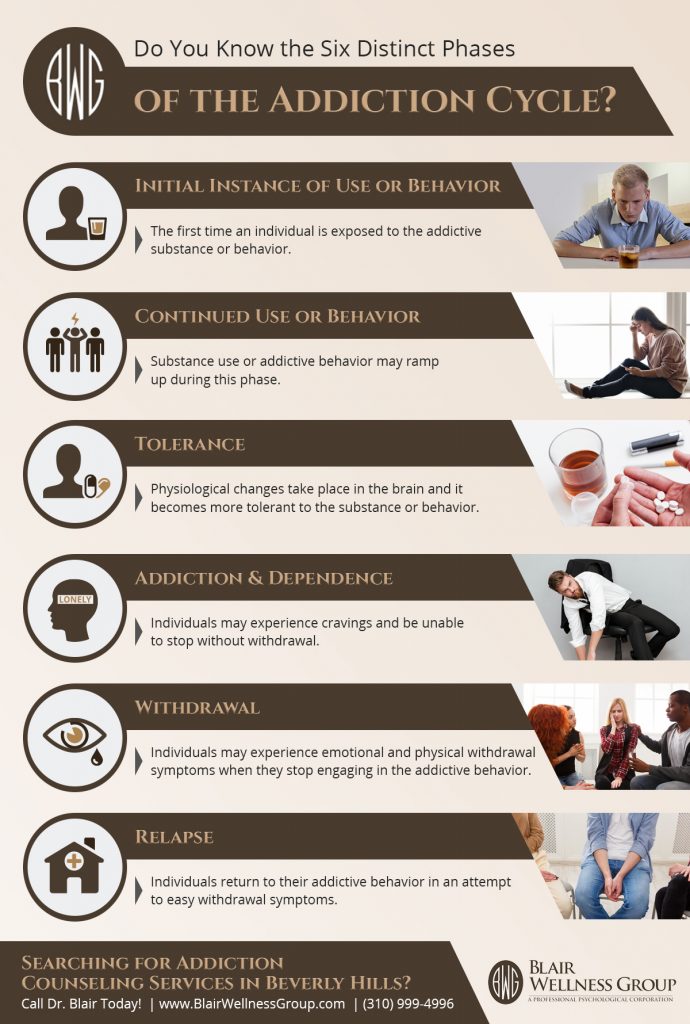While many individuals associate the term “addiction” with drugs, alcohol, and other substances, there are many different types of addiction that can be difficult to overcome. For example, in addition to drugs and alcohol, one may exhibit an unhealthy relationship with anything from love, sex, and relationships to gambling, social media, and pornography. All of these addictions follow a similar cycle, and they all serve a similar purpose of filling some type of void or numbing some type of pain to mask immeasurable suffering. Today, we’ll review the six stages of the addiction cycle to help shed light on this often-misunderstood matter.
Dr. Blair offers addiction counseling services in Beverly Hills that can help individuals break free of the chains that are holding them back from the life they want to live, and our team would love to help you in your time of need. Contact Dr. Blair today to learn more about our concierge-style counseling services.
6 Phases of Addiction
Initial Instance of Use or Behavior
This initial phase describes when an individual first uses the substance or engages in the addictive behavior they struggle with. It may be something as simple as having their first drink on their 21st birthday or experiencing the thrill of cashing in on a winning bet for the first time. The Mayo Clinic notes several factors that may lead to a higher risk of addiction for an individual, including:
- Family history of abuse
- Mental health disorders
- Peer pressure
- Lack of family involvement
- Early exposure to addictive substances or behaviors
- Taking highly addictive substances
Continued Use or Behavior
In this stage, an individual continues to partake in the addictive substance or behavior. The continued substance use or behavioral markers may “ramp up” during this phase, becoming more frequent or more intense as the individual tries to mask feelings and symptoms.
Tolerance
With continued substance use or exposure to the addictive behavior, changes begin to take place in the brain as it becomes more tolerant to the effects of the substance or behavior. This physiological change usually involves a decrease in brain chemical production or a loss of brain chemical receptors. With this tolerance, the addictive behavior no longer has the desired effect it once had. At this point, individuals often increase their dosage or the frequency of their behavior in attempts to achieve the same “high” they did previously.
Addiction & Dependence
With the physiological changes that occur during the tolerance phase comes dependence and addiction — that is the actual physical and emotional need for the substance or behavior. Individuals may experience cravings, devote extra time to their addiction, experience family and relationship problems, and be unable to maintain daily responsibilities. Individuals may also be unable to stop using the substance or engaging in the desired behavior without experiencing withdrawal symptoms.
Withdrawal
Individuals often resolve to stop their addictive behavior, making attempts on their own to avoid using substances or engaging in addictive behaviors. Withdrawal symptoms are commonly experienced during this phase and may include:
- Fatigue, anxiety, and irritability
- Nausea, tremors, seizures
Withdrawal symptoms vary depending on the type and severity of the addiction and the individual. If individuals do not have the tools to cope with their withdrawal symptoms, the odds of relapsing increases.
Relapse
During this last stage of addiction, the individual struggling with addiction and dependence may find the withdrawal symptoms too difficult to cope with. They may seek out the substance or behavior they know will ease this temporary discomfort in an attempt to return back to “normal.” Although friends and family members often view this stage of addiction as a failure on the part of the addicted individual, it is a legitimate stage of drug addiction that is often experienced in the recovery process.
Addiction Counseling Services in Beverly Hills, Irvine, and Newport Beach
Are you looking for more information on addiction to help your loved one in their recovery efforts? Are you struggling with some type of addiction yourself? Dr. Blair offers addiction counseling services in Beverly Hills and help is just a phone call away. Contact Dr. Blair at Blair Wellness Group today to book your appointment.
Don’t forget to check back for our next post, in which we will review common symptoms of addiction and five steps to breaking the cycle of addiction.
















